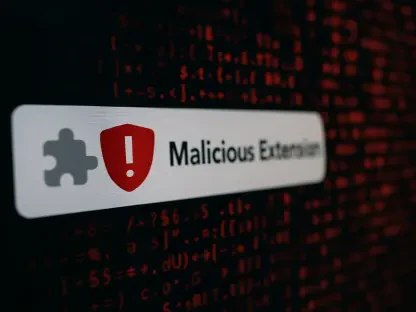The threat of ransomware has become a pressing issue for countries worldwide, as cybercriminals continue to exploit sophisticated technologies to undermine security and demand exorbitant ransoms. A notable development in this ongoing struggle is the coordinated action taken by the United States, the United Kingdom, and Australia against Zservers, a bulletproof hosting (BPH) provider connected to the notorious LockBit ransomware operation. These collaborative efforts aim to dismantle the infrastructure that cybercriminals rely on, potentially disrupting numerous illicit activities.
The Role of Zservers in Ransomware Operations
Providing a Safe Haven for Cybercriminals
Situated in Barnaul, Russia, Zservers has emerged as a pivotal player in the ransomware ecosystem by offering secure infrastructure support to cybercriminals, particularly those affiliated with LockBit. The servers purchased from Zservers have been directly linked to ransomware attacks, making the company an enabler of cybercrime. Notably, the connection between Zservers and LockBit was first discovered in 2022 following a raid conducted by Canadian law enforcement. This revelation highlighted the significant role that BPH providers play in facilitating cybercriminal activities.
Advertising Resistance to Law Enforcement
BPH providers like Zservers market themselves as secure options that are resistant to law enforcement actions, which makes them particularly attractive to cybercriminals. By promoting an image of impenetrable security, these providers enable a wide range of illegal activities, from ransomware attacks to other forms of cybercrime. Disrupting these providers can have far-reaching effects, potentially hampering numerous criminal enterprises at once. The recent sanctions imposed on Zservers underline the strategic importance of targeting the infrastructure that supports these activities.
International Collaboration to Combat Cybercrime
Sanctions by AUKUS Alliance
The coordinated sanctions by the AUKUS alliance, comprising the US, UK, and Australia, target both Zservers’ Russian headquarters and its UK front company, XHOST Internet Solutions. XHOST began operations in 2022 but has roots that trace back to 2011. By striking at both the core and the international extensions of this entity, the AUKUS alliance aims to effectively neutralize its capabilities. UK Foreign Secretary David Lammy emphasized the significance of international collaboration in safeguarding national security and condemned Russia’s support of cybercriminals.
Broader Strategy Against Criminal Infrastructure
The actions against Zservers are part of a broader strategy to dismantle the criminal infrastructure that supports a range of illicit activities, including child exploitation, misinformation, and hate speech. By attacking the foundational elements that cybercriminals depend on, international authorities hope to make significant strides in reducing the frequency and impact of such crimes. This comprehensive approach reflects a growing consensus on the need for coordinated global action to effectively combat the escalating threat of cybercrime.
Targeting Key Individuals and Mitigating Risks
Sanctions on Zservers Associates
The UK took a more extensive approach in its sanctions, listing six individuals associated with Zservers, whereas the US focused on two alleged administrators: Alexander Igorevich Mishin and Aleksandr Sergeyevich Bolshakov. Mishin has played a prominent role in promoting Zservers to ransomware groups and managing cryptocurrency transactions. Both Mishin and Bolshakov have been involved in incidents where they responded to external complaints but continued to support malicious activities behind the scenes. This dual approach of targeting both the infrastructure and key individuals aims to weaken the operational capabilities of ransomware groups.
The Importance of International Cooperation
The sanctions against Zservers and its affiliates underscore the critical need for international cooperation in combating cybercrime. By working together, countries can more effectively tackle the transnational nature of these threats, thereby enhancing global security. The case of Zservers illustrates how collaborative efforts can lead to substantial disruptions in the cybercrime ecosystem. These actions send a clear message to other BPH providers and cybercriminals that their operations will not go unchecked.
The Next Steps in the Fight Against Ransomware
Continuing the Pressure on Cybercriminal Networks
While the sanctions against Zservers mark a significant step forward, the fight against ransomware is far from over. Authorities must continue to apply pressure on cybercriminal networks by targeting their infrastructure, financial resources, and key individuals. This involves not only imposing sanctions but also enhancing international collaboration and intelligence-sharing mechanisms. By maintaining a persistent and coordinated effort, it will be possible to create a more hostile environment for cybercriminals.
Enhancing Cybersecurity Measures
In addition to targeting the enablers of cybercrime, it is crucial to strengthen cybersecurity measures across both public and private sectors. This includes investing in advanced threat detection technologies, promoting best practices in cybersecurity, and ensuring that organizations are well-equipped to respond to potential attacks. By fortifying defenses, it will be possible to mitigate the risks posed by ransomware and other cyber threats, thereby protecting critical infrastructure and safeguarding sensitive information.
Future Considerations for Global Security
The threat posed by ransomware has become a critical issue for nations around the globe. Cybercriminals are increasingly leveraging advanced technologies to breach security systems and demand sky-high ransoms. In response to this growing menace, a significant collaborative effort has emerged involving the United States, the United Kingdom, and Australia. These countries have targeted Zservers, a bulletproof hosting (BPH) provider linked to the infamous LockBit ransomware group. This cooperative initiative aims to dismantle the infrastructure cybercriminals depend on, potentially disrupting a wide range of illegal activities.
The focus of these efforts is not only to take down existing threats but also to prevent future attacks by undermining the resources and tools that cybercriminals use. This strategic collaboration across international borders marks a pivotal moment in the fight against ransomware, reflecting the urgent need for heightened cybersecurity measures and global coordination. By working together, these nations hope to create a safer digital environment and significantly reduce the prevalence of ransomware attacks worldwide.








